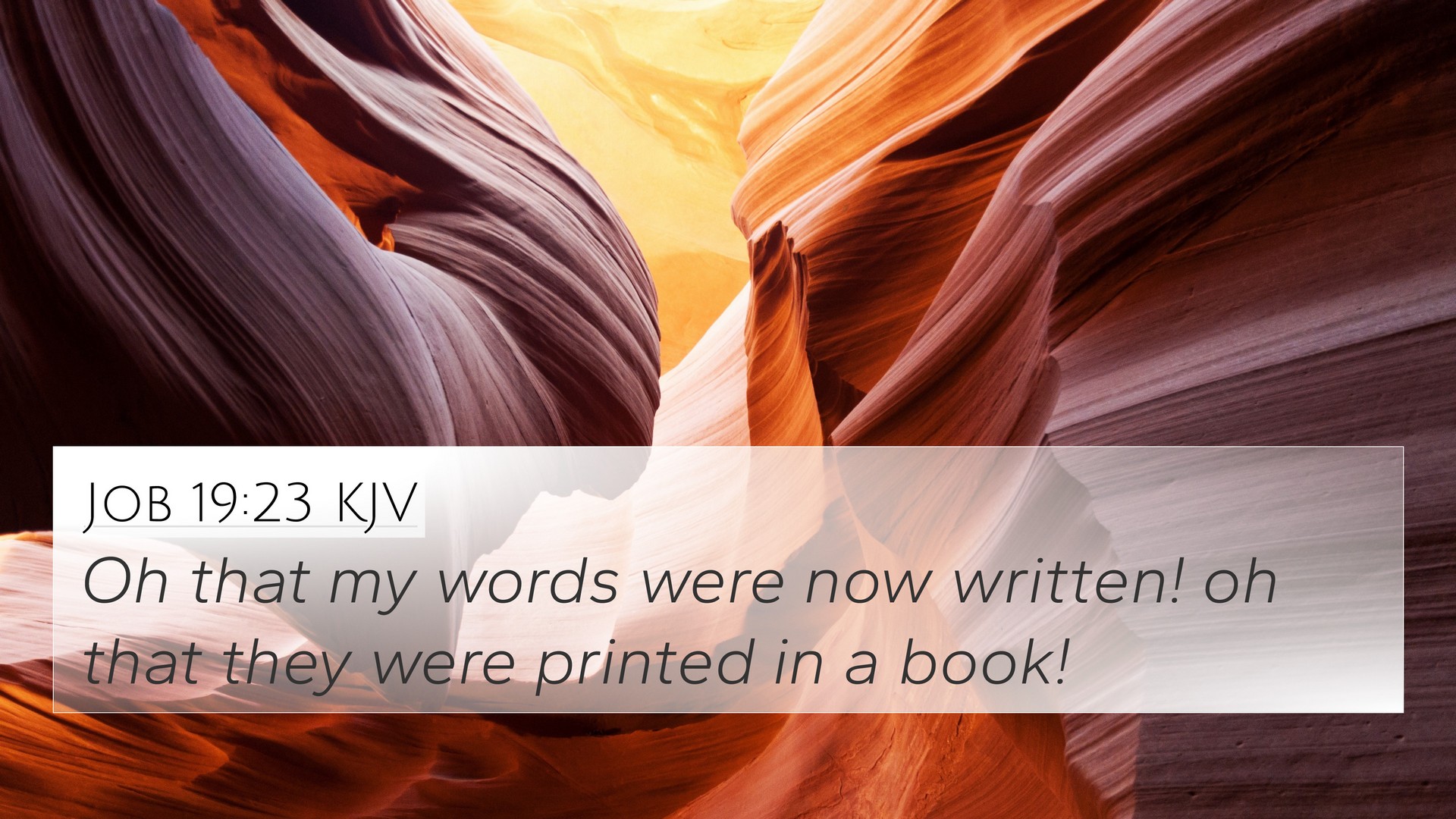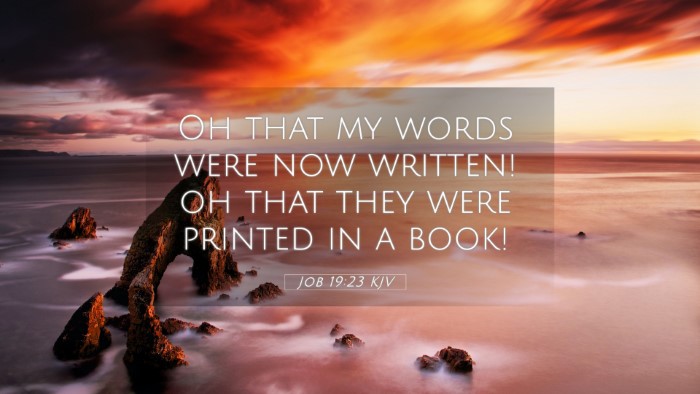Old Testament
Genesis Exodus Leviticus Numbers Deuteronomy Joshua Judges Ruth 1 Samuel 2 Samuel 1 Kings 2 Kings 1 Chronicles 2 Chronicles Ezra Nehemiah Esther Job Psalms Proverbs Ecclesiastes Song of Solomon Isaiah Jeremiah Lamentations Ezekiel Daniel Hosea Joel Amos Obadiah Jonah Micah Nahum Habakkuk Zephaniah Haggai Zechariah MalachiJob 19:23 Similar Verses
Job 19:23 Cross References
Oh that my words were now written! oh that they were printed in a book!
Uncover the Rich Themes and Topics of This Bible Verse
Listed below are the Bible themes associated with Job 19:23. We invite you to explore each theme to gain deeper insights into the Scriptures.
Job 19:23 Cross Reference Verses
This section features a detailed cross-reference designed to enrich your understanding of the Scriptures. Below, you will find carefully selected verses that echo the themes and teachings related to Job 19:23 KJV. Click on any image to explore detailed analyses of related Bible verses and uncover deeper theological insights.

Isaiah 30:8 (KJV) »
Now go, write it before them in a table, and note it in a book, that it may be for the time to come for ever and ever:

Job 31:35 (KJV) »
Oh that one would hear me! behold, my desire is, that the Almighty would answer me, and that mine adversary had written a book.

Isaiah 8:1 (KJV) »
Moreover the LORD said unto me, Take thee a great roll, and write in it with a man's pen concerning Mahershalalhashbaz.
Job 19:23 Verse Analysis and Similar Verses
Understanding Job 19:23
Job 19:23 states:
"Oh, that my words were now written! Oh, that they were printed in a book!"
This verse reflects the deep desire of Job for his words, thoughts, and feelings to be preserved and acknowledged. Job's expression reveals his sense of despair and longing for vindication amidst his suffering. In the face of overwhelming anguish, Job yearns for future generations to see the truth of his experience and stand as a testament to his faith and integrity.
Commentary Insights
- Matthew Henry: He emphasizes the importance of Job's desire for his plea to be recorded, illustrating how profound emotional suffering often leads to a longing for both justice and understanding. Henry notes that Job's wish is rooted in the belief that, despite his troubles, there exists a greater truth that will eventually be recognized.
- Albert Barnes: Barnes points out that Job's yearning for his words to be inscribed highlights the eternal nature of human suffering and the quest for meaning. Barnes connects this with the assurance that God listens to our pleas, and our struggles are not overlooked by the Almighty.
- Adam Clarke: Clarke interprets the verse as a profound personal appeal. He posits that Job desires his sufferings to be documented in a manner that will reveal the truth of his righteousness. Clarke underscores the universal experience of suffering and the innate desire for validation.
Key Themes in Job 19:23
This verse presents several themes worth exploring in the context of cross-referencing Biblical texts:
- Suffering and Vindication: Job’s desire for his words to be written serves as a testament to the human experience of seeking justice. This can be connected to Psalm 94:1, which speaks to God as a God of vengeance, implying the hope for divine justice.
- The Power of Words: The wish for words to be inscribed suggests the significance of what we say and how it may endure over time. This theme resonates with Proverbs 12:18, where the tongue has the power to bring life or death.
- Hope and Despair: Job's cry reflects both hope for future acknowledgment and despair in current suffering, akin to the sentiments expressed in 2 Corinthians 4:8-9, which speaks to being hard-pressed yet not crushed.
- Legacy of Righteousness: Job's thoughts on his words emphasize the desire to leave a legacy of truth, similar to Philippians 4:8, which encourages believers to focus on what is true, noble, and right.
- The Written Word: Job’s reference to a 'book' presages the later importance of scripture and the written word in the faith community, as seen in 2 Timothy 3:16-17, affirming the divine inspiration of all scripture.
- Divine Presence in Suffering: The verse can also be related to Romans 8:18, which reflects on the sufferings of this present time not being worthy to be compared to the glory that is to be revealed.
Cross-References for Job 19:23
To fully grasp the implications of Job 19:23, it is beneficial to explore related verses that echo similar sentiments:
- Psalm 37:29 - "The righteous will inherit the land and dwell in it forever."
- Isaiah 30:8 - "...write it on a tablet, and inscribe it on a scroll, that it may be for the time to come forever and ever."
- Revelation 21:4 - "He will wipe every tear from their eyes. There will be no more death or mourning or crying or pain..."
- Job 23:12 - "I have not departed from the commands of his lips; I have treasured the words of his mouth more than my daily bread."
- Ecclesiastes 12:12 - "...of making many books there is no end, and much study wearies the body."
- Psalms 102:18 - "Let this be written for a future generation, that a people not yet created may praise the Lord."
- 1 Peter 1:25 - "But the word of the Lord endures forever." And this is the word that was preached to you.
Conclusion and Final Thoughts
In summary, Job 19:23 encapsulates the longing for recognition and the desire for justice amid suffering. Through the insights gathered from various public domain commentaries, we see that Job's heartfelt wish reflects universal themes that resonate with believers across generations: the poignancy of human experience, the importance of words, and the hope embedded in divine providence. The verses connected to Job 19:23 serve to deepen our understanding of scripture, providing a richer perspective through thematic Bible verse connections, cross-referencing Biblical texts, and engaging in inter-Biblical dialogue.


